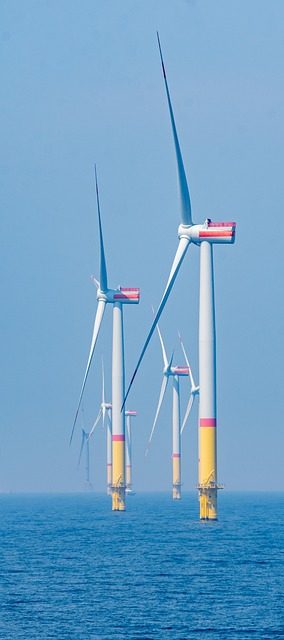The Year of Gloom continues for Wind Power
Wind energy is so cheap and profitable that last week, investors abandoned the annual UK auction to build industrial wind plants in the oceans around the UK. Exactly no one offered to spend money building turbines even though electricity prices are burning hot. Apparently prices for building the machinery to collect and transmit low density erratic energy are not “free” like the wind. Even after decades of advances, sacred green electrons still cost a lot more than war-afflicted-fossil-fuel electrons do.
The free market has spoken and it said “No”. At The Guardian though – it was, of course, all the Governments fault. That and the dreaded Hand Of Inflation. It’s so unfair:
‘Biggest clean energy disaster in years’: UK auction secures no offshore windfarms
Lack of interest was widely expected after government failed to heed warnings about soaring costs
Jillian Ambrose
None of the companies hoping to build big offshore windfarms in UK waters took part in the government’s annual auction, which awards contracts to generate renewable electricity for 15 years at a set price.
The companies had warned ministers repeatedly that the auction price was set too low for offshore windfarms to take part after costs in the sector soared by about 40% because of inflation across their supply chains.
Matt Ridley explained what really happened:
Electricity from wind isn’t cheap and it never will be
The latest auction of rights to build offshore wind farms failed to attract any bids, despite offering higher subsidised prices. That alone indicates that wind is not cheap or getting cheaper.
But the real reason for the lack of interest in the auction is that, for the first time, bidders are not free to walk away from their bids when it suits them. In the past, they could put in low offers, boast about them being cheap, then take the higher market price later. The Government has at last called their bluff, so they are having to admit that electricity prices need to be higher to make wind farms pay.
The cost of subsidising wind is vast. Then add the cost of getting the power from remote wind farms to where people live. And the cost of balancing the grid and backing wind up with gas plants for the times when the wind drops. And the cost of paying wind farms to reduce output on windy days when the grid can’t take it.
And yet the wind industry is complaining that today’s high electricity prices are not high enough, and without more subsidies they will stop building
The true cost of adding wind power to the electricity grid was always hidden with complex schemes.
It’s a catastrophe
At The Guardian, this auction was described as “catastrophic”, so we know it’s good news:
Sam Richards, the founder and campaign director of Britain Remade, which campaigns for economic growth in Britain, said the “catastrophic outcome” of the auction was “the direct result of the government’s complacency and incompetence”.
The government didn’t listen to the industry:
Industry insiders said the three offshore wind developers behind these plans – SSE, ScottishPower and the Swedish company Vattenfall – were forced to sit out the bidding after ministers refused to heed their warnings.
Now if the Government had listened to Exxon that would have been evidence of the planet-wrecking influence of Big Oil, but if the government didn’t listen to Big Renewables, it was incompetent.
Things are so bad, the wind industry is abandoning current half built projects:
The industry warnings intensified after Vattenfall said in July that it would cease working on the multibillion-pound Norfolk Boreas windfarm because rising costs meant it was no longer profitable.
Apparently the British government should have taken more money from citizens or forced the prices of electricity up for customers in order to “deliver low cost energy”, whatever that is:
Keith Anderson, the chief executive of ScottishPower, said: “This is a multibillion-pound lost opportunity to deliver low-cost energy for consumers and a wake-up call for government.
This “Low Cost Energy” seemingly refers to some mythical electrical kilowatthours that only show up on academic reports not on consumer electricity bills.
NetZeroWatch asks if this a landmark moment for renewables
Sept 8th, 2023: The Government has today announced the results of the fifth auction of Contracts for Difference subsidies for renewable electricity generation. Its has been a failure, and may represent a landmark moment for renewables policy.
Only 3.7GW of new capacity has bid successfully, mostly through small projects, as compared to nearly 12GW last year. There were no bids for offshore wind, the UK’s flagship renewable generator.
Participants in the auction bid for guaranteed prices, below a cap set by ministers in advance of the auction. The cap for offshore wind was set at £44/MWh (in 2012 prices, equivalent to around £70/MWh today). This is higher than successful bids in the past, yet no wind farm developers felt able to bid at this price. Wind industry claims that this is due to rising prices are implausible – CfD contracts are index-linked.
…UK offshore wind costs have not been falling dramatically as the industry claimed. All around the world the wind industry is in trouble for the same reasons; costs remain high, and high levels of subsidy are needed to reward investors.
Andrew Montford, director of Net Zero Watch, said:
Government seems to have believed the spin about falling offshore wind costs, and set a low cap on bids for new contracts, thus calling the wind industry’s bluff by accident.
